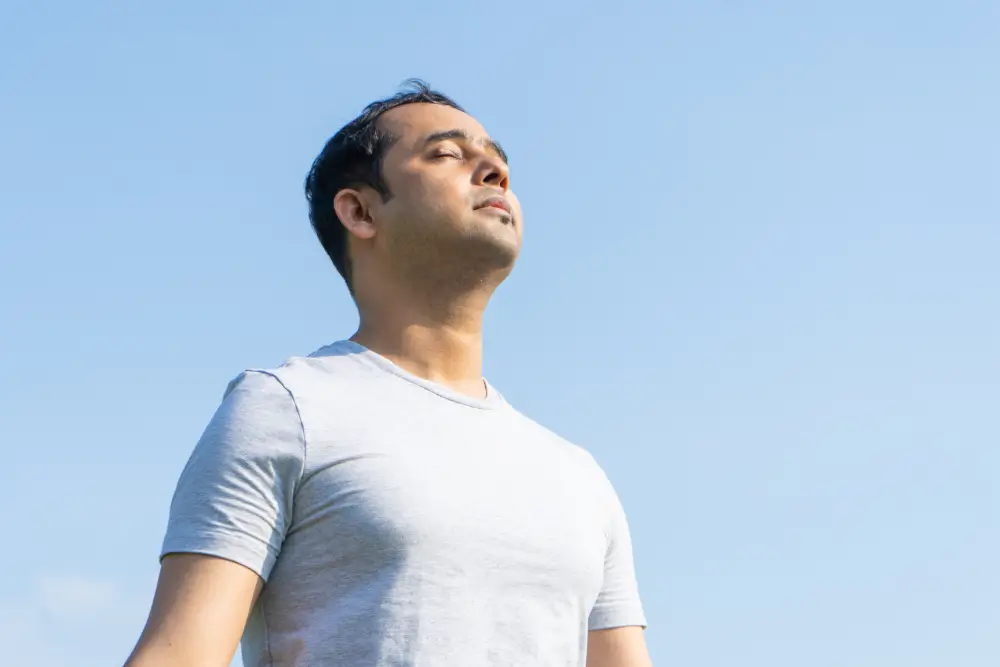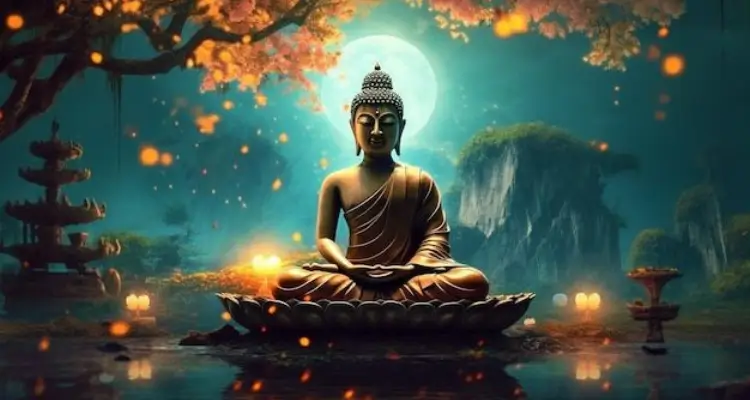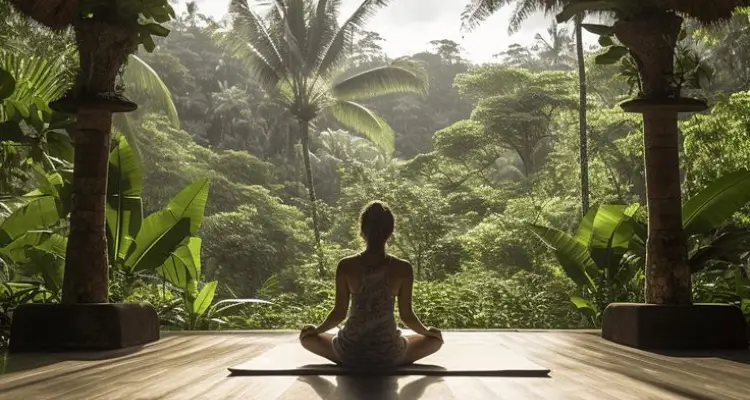Nowadays, many of us feel like life is passing by too quickly, as if we’re constantly chasing something that never seems to arrive. Modern society constantly pushes us toward consumption, the relentless pursuit of success, money, and recognition. Yet, even when we achieve these things, a sense of emptiness and dissatisfaction lingers. It feels as if, no matter what we’ve gained, something is always missing to make us truly happy.
This emptiness can be explained by constantly seeking happiness in the wrong place. We’re so focused on what is material, on what we can have, that we forget to look inside ourselves. True happiness isn’t in more possessions or status, but in a way of living more consciously, more present in the now. The Buddhist lifestyle offers us an alternative to this. It invites us to slow down, stop running, and find balance within ourselves.
Buddhism teaches us that by living more attentively and present, we can find happiness in the simple things in life. It’s not about radically changing our lives but about changing the way we live. Instead of getting lost in worries and anxieties about the future, we can learn to appreciate the present moment as it is, with all its highs and lows.
In this article, we will explore what the Buddhist lifestyle is, its fundamental pillars, and how it can be an alternative to finding more balance and presence in your life. By adopting these principles, you’ll notice a significant shift in how you relate to life, people, and yourself.
The Unstoppable Race of Society
Modern society, increasingly connected and demanding, pushes us to constantly seek more: more success, more money, more recognition. From a young age, we are encouraged to accumulate, to achieve, to be more, as if this were the key to happiness. We live in an endless race, where goals and objectives are always ahead, and the feeling that we need to achieve more to be complete accompanies us every step of the way. Advertising, social media, and even family expectations reinforce this cycle, making it almost impossible to break.
However, even when we achieve these material conquests, a feeling of emptiness arises. Professional success, financial stability, or fame, for example, are not capable of filling the emotional gap many people feel. Often, the sense of dissatisfaction grows even more because, once what once seemed to be the key to happiness is achieved, we realize that something is still missing. The search for more seems to never end. This cycle creates a constant state of anxiety and frustration, which can distance us from true inner peace.
The Buddhist lifestyle offers a radical change in this dynamic. Instead of continuing to chase external and material goals, it invites us to stop and look within. Instead of seeking satisfaction in what is outside of us, Buddhism teaches us to find joy and contentment in the small things of everyday life. The proposal is to live with more presence and awareness, appreciating every moment, without the need for more achievements to feel complete.
This lifestyle teaches us that true peace does not come from the outside, but from within. It calls us to question what truly matters, helping us understand that happiness is not in the relentless race, but in the ability to stop and be fully present in the moment. In this way, we can break the vicious cycle of endless seeking and start finding satisfaction in the simplicity of everyday life.
What is the Buddhist Lifestyle?
The Buddhist lifestyle is essentially a way of living with more presence and meaning. In a world so fast-paced, where we are constantly pressured to do more, achieve more, and consume more, Buddhism invites us to slow down and live more consciously. It’s not about radical changes but transforming the way we approach our daily life. It’s about being fully present in each moment, even in the most simple and routine tasks, and finding beauty and satisfaction in small things.
Adopting the Buddhist lifestyle emphasizes not abandoning everything we know but changing our perspective and relationship with life. It’s about practicing mindfulness, which helps us connect with what we are doing without distractions or judgments. The goal is to notice and appreciate the present moment without the constant urge to seek more or worry about what’s to come. Focusing on the “now” allows us to live more balanced lives without losing ourselves in past worries or future fears.
A practical and simple example of this is transforming routine tasks, like washing dishes, into a mindfulness practice. Instead of doing the task automatically, while getting lost in thoughts or even complaints, we can focus entirely on the moment. By feeling the water on our hands, noticing the movement of the sponge, and even the soap bubbles, we are practicing full attention. This simple exercise helps us be more present and appreciate what we would normally do without even thinking. By turning small daily actions into mindfulness moments, we can bring more peace and meaning into our day.
Over time, this lifestyle allows us to develop greater inner peace, more gratitude for what we already have, and a deeper connection with the world around us. With time, the small changes in our way of thinking and acting can have a significant impact on our lives, bringing balance, serenity, and genuine satisfaction.
The Three Pillars of the Buddhist Lifestyle
The Buddhist lifestyle is built upon three fundamental pillars that help us live with more balance and presence: mindfulness, simplicity, and gratitude. These principles don’t require drastic external changes but rather an internal transformation in the way we think and act. Let’s explore each of them in more detail and discover how to apply them in our daily lives.
1. Mindfulness
Mindfulness is the practice of being fully present in whatever we do. Instead of living on autopilot, mindfulness invites us to focus on the present moment, experiencing every sensation, thought, and action without distractions or judgments. This is the first step toward achieving a more conscious and fulfilling life.
Practical tips for practicing mindfulness:
- Focus on your breath: Set aside a few minutes each day to simply observe your breath. Feel the air entering and leaving your lungs, and focus on the sensation of being alive.
- Be mindful in daily activities: When doing simple tasks, like walking, washing dishes, or eating, fully concentrate on what you are doing. Notice the details—textures, sounds, and smells—without letting your mind wander to worries or distractions.
Mindfulness allows us to slow down and savor the present, instead of always chasing the next goal or worry.
2. Simplicity
We live in a society that values complexity and abundance. We are constantly acquiring things, accepting commitments, and seeking more. However, the Buddhist lifestyle teaches us to simplify, to prioritize what truly matters, and to reduce what is unnecessary. Simplicity brings clarity and space for what truly holds value in our lives.
Examples of how to simplify life:
- Reduce commitments: Instead of trying to be everywhere and do everything, learn to say “no” to commitments that don’t align with your values and goals. Focusing on what really matters increases the quality of your time.
- Focus on essentials: Evaluate the things you own, the activities you engage in, and the people you surround yourself with. True happiness comes from focusing on the essential and letting go of the superfluous.
Simplicity doesn’t mean giving up everything but making conscious choices that help us live a lighter and more meaningful life.
3. Gratitude
The practice of gratitude is one of the most transformative aspects of the Buddhist lifestyle. Often, we focus on what we lack instead of valuing what we already have. Gratitude teaches us to recognize the value of the things in our lives, no matter how simple they may seem. It helps us cultivate a constant sense of contentment, rather than constantly seeking more.
Practical suggestion for cultivating gratitude:
- Be grateful upon waking up: When you open your eyes in the morning, take a moment to be thankful for being alive and for having a new day ahead. This simple gesture can change the way you approach the rest of your day.
By practicing gratitude, our perspective on life becomes more positive, and we learn to appreciate the little things that we might have otherwise overlooked.
The Impact on Daily Life
Applying the pillars of the Buddhist lifestyle to everyday life brings real benefits to our mental and emotional well-being. By living with more presence, simplicity, and gratitude, we can transform the way we approach daily situations, and this has a profound impact on our quality of life. Let’s see how this plays out in practice.
Benefits of Applying the Pillars
Reduction in anxiety and stress:
When we live on autopilot, our minds are constantly overloaded, trying to handle multiple tasks at once. This increases anxiety and stress. By practicing mindfulness, we can slow down and focus on the present moment, significantly reducing these feelings. With regular practice, we begin to notice less agitation and more calm in our lives.
Greater appreciation of the small things in life:
In such a fast-paced world, we often overlook the small things that truly bring happiness and meaning. The Buddhist lifestyle teaches us to stop and pay attention to these simple moments, like the breeze on our face or the taste of a meal. This creates a sense of contentment and helps us appreciate what we already have, rather than always seeking more.
Practical Examples
Transforming tedious moments into opportunities for mindfulness:
We often spend the day performing repetitive and seemingly meaningless tasks, like washing dishes or dealing with traffic. However, these moments can become mindfulness practices if we adopt full attention. Imagine you’re washing the dishes. Instead of letting your mind wander, focus on the sound of the water, the texture of the soap, and the sensation of your hands moving. This simple act of being present transforms a tedious task into a richer, more satisfying experience.
Adopting gratitude in challenging situations:
Life doesn’t always go as planned, and in tough times, it’s easy to focus on what’s wrong. Buddhism teaches us to practice gratitude even in adverse situations. For example, if you’re stuck in traffic and feeling frustrated, try to pause and reflect on something you’re grateful for—maybe your health, the opportunity to have some time to yourself, or the simple fact of being alive. This shift in perspective can transform the experience and help you remain calm, even when circumstances are challenging.
By applying the pillars of the Buddhist lifestyle in moments throughout our day, we can find more balance, peace, and satisfaction. Instead of seeking happiness in external achievements, we begin to find joy in the simple things and in connecting with the present moment. The impact of this shift on our daily lives is profound and transforms the way we handle even the most difficult challenges.
How to Get Started?
Adopting the Buddhist lifestyle doesn’t require radical changes, but rather small transformations in the way we approach daily life. You don’t need to completely turn your routine upside down, but starting with simple and gradual steps can have a profound and positive impact. Here are some suggestions to begin your journey toward a more present, simple, and grateful life.
Daily Mindfulness Practices
Mindfulness is at the heart of the Buddhist lifestyle. To start practicing it, simply dedicate a few minutes each day to being fully present during everyday activities. This can be done in a simple way, like brushing your teeth, eating, walking, or even washing dishes. The key is to focus on what you’re doing in the moment without getting distracted by thoughts of the past or worries about the future.
Practical Tips:
- Set aside 5 minutes in the morning or before bed to focus on your breath.
- When performing daily tasks, stop and notice the small details: texture, sound, movement.
- Whenever your mind wanders, gently bring it back to the present moment without judgment.
Review Priorities to Simplify Your Routine
Modern life pushes us to stay busy and overload our schedules with commitments and responsibilities. The Buddhist lifestyle invites us to review our priorities and simplify our routines. This means dedicating more time to activities that truly matter and reducing unnecessary things.
Practical Tips:
- Make a list of your daily responsibilities and analyze what is essential and what can be discarded or delegated.
- Try to reduce excessive commitments and avoid multitasking by focusing on one task at a time.
- Give more space to activities that bring peace and joy, like meditating, walking outdoors, or simply resting.
Establish a Gratitude Habit
Gratitude is a fundamental practice in the Buddhist lifestyle as it helps us recognize and appreciate what we already have. Start your day with a moment of gratitude, reflecting on the things you are thankful for. This can be as simple as being thankful for your health, family, or simply being alive. This small habit can shift how you view life and increase your contentment.
Practical Tips:
- Upon waking, make a mental list of at least three things you’re grateful for.
- Throughout the day, pause for a moment and notice the small blessings around you: the hot coffee, nature, the company of friends.
- At the end of the day, reflect on what went well and thank yourself for the experiences and lessons learned.
Conclusion
Recapping the benefits of the Buddhist lifestyle, we see that it offers a unique approach to dealing with the challenges of modern life. By practicing mindfulness, you begin to live more present and attentively, reducing anxiety and stress. Simplicity, by prioritizing what truly matters, brings a sense of relief and clarity, while gratitude teaches us to appreciate what we have, rather than focusing on what we lack. Together, these pillars create a solid foundation for a more balanced, peaceful, and meaningful life.
The Buddhist lifestyle is not a quick fix or an obstacle-free path, but an invitation to live with more depth and balance. It teaches us that true happiness does not lie in external things, but in how we live and relate to the present moment. By adopting this lifestyle, we can transform our daily routine into a journey of self-discovery and inner peace.
By adopting the Buddhist lifestyle, you are inviting yourself to a life of more meaning and connection with the present. It is not about perfection, but learning to live with more attention, simplicity, and gratitude.
What do you think would change the most in your life by adopting this lifestyle? Leave your comment and share your reflections with us!

































